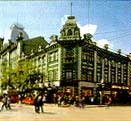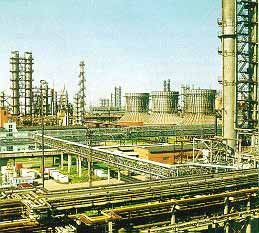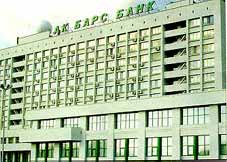Tatarstan
President Mintimer Shaimiev says: "Today we are the true owners of all the wealth in
our country."
Tatarstan is proud of its long history - even if the
name 'Tatar' still strikes fear in the subconscious of many Russians and other Europeans.
Islamic since the 10th century, Tatarstan was later
annexed by Gengiz Khan, to become part of |
TATARSTAN
 |
the powerful Golden Horde state.
Subsequent incorporation into Tsarist and
Soviet Russia left many Tatars unhappy with their lot, though their capital, Kazan, became
a major industrial center and transport hub. Then oil and gas brought added prosperity,
and the collapse of Communism opened the way to a degree of autonomy unthinkable within
most federal systems. |
|
TATARSTAN |
AN INDEPENDENT TERRITORY MAKING THE MOST OF ITS
NATURAL RESOURCES |
| Republic has freedom within the Federation
Tatarstan enjoys almost total control over ils internal
affairs and its vast energy reserves |
 |
Among
the various republics, regions and other territories which make up the complex Russian
Federation, the Republic of Tatarstan has attained one of the highest degrees of autonomy.
But it has stopped short of declaring full independence.
Tatarstan's President, Mintimer Shaimiev, explains
what happened at the time of the break-up of the old Soviet Union, when republics from
Ukraine and Moldova in the West to Kazakhstan and Kyrgyzstan in the East opted to go their
own way.
"All the streets and squares were full of people
shouting the slogan 'independence'. So I went out and made a speech, and asked them to be
calm - but I didn't pronounce the word
Shaimiev: Akoulov:
prepared stable

|
'independence'. It would have led to a real confrontation and even to war,"
the President says.
Mr Shaimiev indicated at the time that he was
prepared to negotiate and sign a treaty with the Russian Federation, and now Tatarstan
governs almost all of its own internal affairs, and even has the right to develop
international relations independently of Moscow. However, the Russian Federation keeps
control of military factories on Tatarstan territory, as well as higher education. It also
receives half of the monies raised from value added tax.
Political affairs
The
President's adviser on political affairs, Raphael Khakimov, says the government has not
gone any further than that for several reasons.
"First of all, the Tatarstan Republic is
situated within the Russian Federation, and has no external borders. |
And secondly, there is the ethnic problem.
"Many Tatars live outside Tatarstan, in other
parts of the Russian Federation, and it is impossible to break relations with those who
live in the Republic."
Tatars only slightly outnumber Russians, and there
are more than 60 minority nationalities.
Tatarstan has the huge advantage of being oil-rich.
This means, for example, that it can proclaim an official minimum wage that is four times
that of Russia's.
But the government is keen not to depend too much on
oil. Dr. Khakimov says: "We know that oil is an opportunity for us to survive the
transition period. That's why we are trying to develop not only the oil industry, but also
other industries, starting with equipment for extracting oil."
Agriculture is still important too, with over a
quarter of the population of less than four million living off the land. |
President Shaimiev is taking a more cautious approach to economic reform than that
of Moscow.
"In 1992, when the radical reforms began, we
said we were also in favor of reforms, but we were against so-called Уshock-therapyФ.
We were criticized then for conservatism. But I said we would adopt reforms step by step
and because of that, we didn't see a big drop in living standards."
On official visits overseas President Shaimiev has
raised people's awareness about Tatarstan and its special status. His international
advisor, Timour Akulov, says there are many reasons why foreign investors are attracted to
the Republic.
"First, there's a very developed
material-technical base and a huge scientific potential. Secondly, it is a stable
political and social environment. Also, the legislative base of our republic is much
better developed than in any other region of the Russian Federation," he says. |
SUVAR so good: Tatarstan oil
continues to attract foreign investors |
One
of the most practical benefits that Tatarstan gained through the autonomy agreement
reached with the Russian Federation was the greater control it won over its oil industry
and revenues.
Though oil is notoriously vulnerable to price
fluctuations on the world market, the Republic's Minister for Economy and Industry, Rinat
Gubaidullin, is optimistic about the prospects in this sector. "There are favorable
conditions for the export of oil, as with other export-oriented production, because
of the devaluation of the rouble," he says.
Moreover, oil is a sector foreign
banks and investors are interested in. "The financing of the republic's construction
project for a new oil-refining plant to process seven million tons of oil a year is
maintained thanks to a 115 million dollar credit received from Citibank, with a guarantee
from Eximbank in the US," he adds.
Tatarstan has had to set up or reform
oil-related companies and institutions in order to deal with the changed situation. |
One such is SUVAR, which acts as a government agent to sell oil both within the
Russian internal market and abroad. It thus works closely with the main producing
company TatNeft.
SUVAR's General Director Boris Chub
says: "TatNeft didn't have any department within it that was working with exports,
but we had a license for exporting oil. So we proposed ourselves as a possible exporter,
based on experience of working with many cities and regions within the Russian
Federation."
He adds: "Although 12 companies
from Tatarstan were seeking that position, we survived the competition, and from 1993
began trading oil as the monopolists in that market.
"Rather that put all their eggs
in one basket however, SUVAR did not limit its operations to working with TatNeft, despite
the fact that was for some time such a profitable arrangement. Mr Chub says: "We also
worked a lot with a Moscow oil-refinery, and the Kremenchuge oil-refinery. Currently, we
are working with the metallurgical complexes of Russia and Ukraine." |
Such diversification proved wise. Mr Chub says: "When the situation in the
oil-petro market got harder, our company did not collapse, in spite of the fact that the
turnover dropped.
"Nowadays, we export about three
million tons together with TatNeft. Germany and the United States are the main markets.
"Chase Manhattan granted TatNeft
a credit of 156 million dollars, and we work as operators of this credit, which means that
we provide oil to the company appointed by Chase Manhattan Bank."
Current
climate
In the current climate, it is
difficult to open up new markets for oil. And there is the added hindrance of competing
with the biggest international companies.
Mr. Chub says. "If you compare
TatNeft with Shell, for example, you can see the difference in the rating of their shares.
"Nevertheless, over the last
three years, TatNeft's stock has increased a lot in value." |
Mr Chub wants to start working seriously in industrial production but there are
obstacles to overcome. He says: "We have made attempts to produce, but existing laws
in this country do not let production develop effectively: there is very high taxation,
most of which are so-called 'undercover' taxes, which make the primary cost of the product
rather high.
"We also understand that our
products here are of a lower quality than their equivalents in Western countries. In
consequence, foreign investors are not attracted to the productive sphere."
Mr Chub hopes that situation can be
resolved by transferring the tax burden from the producer to other sectors in the chain of
production, and cutting taxes as a whole.
Chub: production
 |
Petrochemicals giant set to expand |
New technology and joint ventures have helped Nizhnekamskneftekhim to
increase its production capacity
Tatarstan is home to the largest petrochemical company in
Europe, bearing the tongue-twisting name (for Westerners) of Nizhnekamskneftekhim. Based
in the republic's third city, Nizhnekamsk, the company has more than 16,500 people on its
payroll.
Exporting to over 20 countries, Nizhnekamskneftekhim
manufactures a range of products, from butyl rubber, ethylene and propylene to styrene and
polyether tars.
Managing Director Rinat Galiev attributes much of the
company's growth over the past 30 years to a strategy of 'quality, quantity and low
prime cost'. The use of surplus stocks of products such as styrene and butadiene as raw
material input has facilitated the relatively low-cost development of new product ranges.
At the same time, technological processes are constantly
being renewed and refined, much of the necessary research and development being done at
the company's own Science and Technology Center.
Raw
materials
Mr
Galiev says: "The most important goal today is to increase our capacities through the
introduction of new technologies, the deeper processing of raw materials and by more
automation of the whole process."
Some of the modernization currently going on at
Nizhnekamskneftekhim has been made possible by foreign credit, but Mr Galiev is cautious
about letting the company take on too much debt.
He says: "We are very careful about questions of
credit and investments because, to my mind, an investment is a debt, which you ought to
pay back some day."
Nonetheless, joint ventures of various kinds are
playing an important role in the company's strategy. Mr Galiev says the company has had a
positive experience with Petrokam, a joint venture between the Tatarstan Republic and
Germany, producing ethylene glycol. Antifreeze is also produced through a joint venture,
this time with an American firm, and US assistance is helping the construction of
hydrocleansing installations too.
Nizhnekamskneftekhim has a representative office in
New York. Mr Galiev says: "We would like to win markets in Canada through our
representation in the US. Currently, we sell more than 1,000 tons of rubber per month on
the American continent. The only problem we have is a lack of products on that market.
That is why we are increasing our capacity annually."
Domestically however, the
company has had to confront other difficulties. "We don't have a stable political and
economic situation in Russia," |
Rubber plant :
over 1,000 tons of rubber are exported to the US each month

says Mr Galiev. "We have had to
make huge outlays because of the collapse of the banking system, and the changes in
government.
Galiev: outlays

"Nevertheless,
we have been able lo work thanks to the more or less stable situation in the Tatarstan
Republic. This h,is really been possible because the republic's government helps in
stabilizing industry here, and takes all due measures in order to keep a stable
position."
Another advantage Nizhnekamskneftekhim enjoys is its
geographical location. Less than 10 miles away from the enterprise's industrial zone there
is a dry cargo river terminal, with access to waterways that are open for navigation from
May through November.
Liquids are mainly transported by rail, with many of
the railway tank wagons traveling to Kotka in Finland, where there are storage tanks for
the transshipment of products such as propylene oxide, the development of which has been a
particular personal interest of Rinat Galiev.
Environmental
protection
Acutely
conscious of the dangers that can be associated with the petrochemical industry,
Nizhnekamskneftekhim has installed a range of environmental protection facilities. The
company uses an advanced water recircula-tion system, and the industrial complex has its
own sewage disposal.
New technology has been developed and introduced to
collect and render harmless gaseous emissions, as well as employing biotreatment to deal
with highly polluted waste water. |
United banks bring renewed
confidence
Sum is larger than the parts for a
financial sector that is continuing to expand
|
| Shortly after Tsar Alexander II decreed the setting up of
the State Bank of the Russian Empire in 1860, a branch was opened in Kazan, now capital of
Tatarstan. Even then, the area was key to the economic and cultural development of central
Russia, and the bank was used as the gold depot for Russia. |
After the Communist
Revolution of 1917, the bank was transformed into the State Bank of the USSR, with all
relevant major policy settled in Moscow. But the situation changed dramatically in 1994,
when an agreement was signed between the Russian State Bank and what had become the
National Bank of the Tatarstan Republic. |
Big
is beautiful: Ak Bars Bank, set up in 1993, is the
largest in Tatarstan
 |
|
Bogachev:
powers

The National Bank's President, Evgeny Bogachev, says:
"We got many plenary powers due to the agreement, specifically we can fix rates
ourselves. We can issue our own promisory notes and cheques. We have extended rights of
control, registration and inspection. But we are not completely independent from the Bank
of the Russian Federation."
The National Bank's main aims are to promote the
reorganization of the economy, the further development of the economic structure and the
maintenance of the Republic's economic life.
The enhanced autonomy Tatarstan has enjoyed in recent
years has opened up new areas of banking and financial cooperation |
abroad
as well. Minister of Economy and Industry, Rinat Gubaidullin, says: "We have the
right to conclude trade and economic agreements with foreign countries independently, to
participate in the work of international economic and financial organizations, to attract
government, bank and commercial credits with the guarantees of the government of
Tatarstan, and to create free economic zones on the territory of the Republic."
As in many parts of the Russian Federation, however,
the banking sector has undergone some difficult times, and the total number of local banks
has declined by a quarter, to about 30.
Mr Gubaidullin says: "One of the measures for
overcoming the crisis is uniting the forces of a group of banks - Ak Bars Bank, Tatfond
Bank, Volzhsko-Kamski Bank-to provide mutual support and help." |
Idrisov:
principles

Ak Bars
Bank is the largest bank in Tatarstan, indeed third in the Russian Federation in terms of
authorized capital and seventh in terms of total assets. Yet is a young institution, set
up only in 1993. Il is authorized lo hold the gold reserves of the Republic of Tatarstan,
and since 1998 has a general license for currency operations.
Ak Bars Bank's Chairman, Mudaris Idrisov, fluently
produces a list of statistics: "Ak Bars Bank has 34 representations, with 11 branches
in different regions of Tatarstan and other republics. We are also expecting lo set up 23
new offices all over the Russian Federation. So we continue working on expanding our
system, and hope to do so in the future." |
High level
Nonetheless, the bank has not been
able to avoid the effects of what is going on in other parts of the Russian
Federation. "Being the subject of Russia, Ak Bars Bank feels that crisis
itself," Mr Idrisov says. "That's why we have to amend our strategy and
principles. It is impossible today to plan for the next few years."
However, Mr Idrisov is far from gloomy. "The
main goal for us today is to restore the confidence of investors. The image of the
Tatarstan Republic is on quite a high level, and we would like to confirm it."
He is particularly keen to see greater links with the
US. "I study everything that is happening in the United States attentively," he
says. "Frankly, I like that country very much and I like the people living there.
They are an open people, and when I'm abroad, I always recognize them immediately!" |
This
supplement has been prodused by Universal News Inc. The editors of U.S. News & World
Report did not participate in its preparation and beer no responsibility for its content |
|